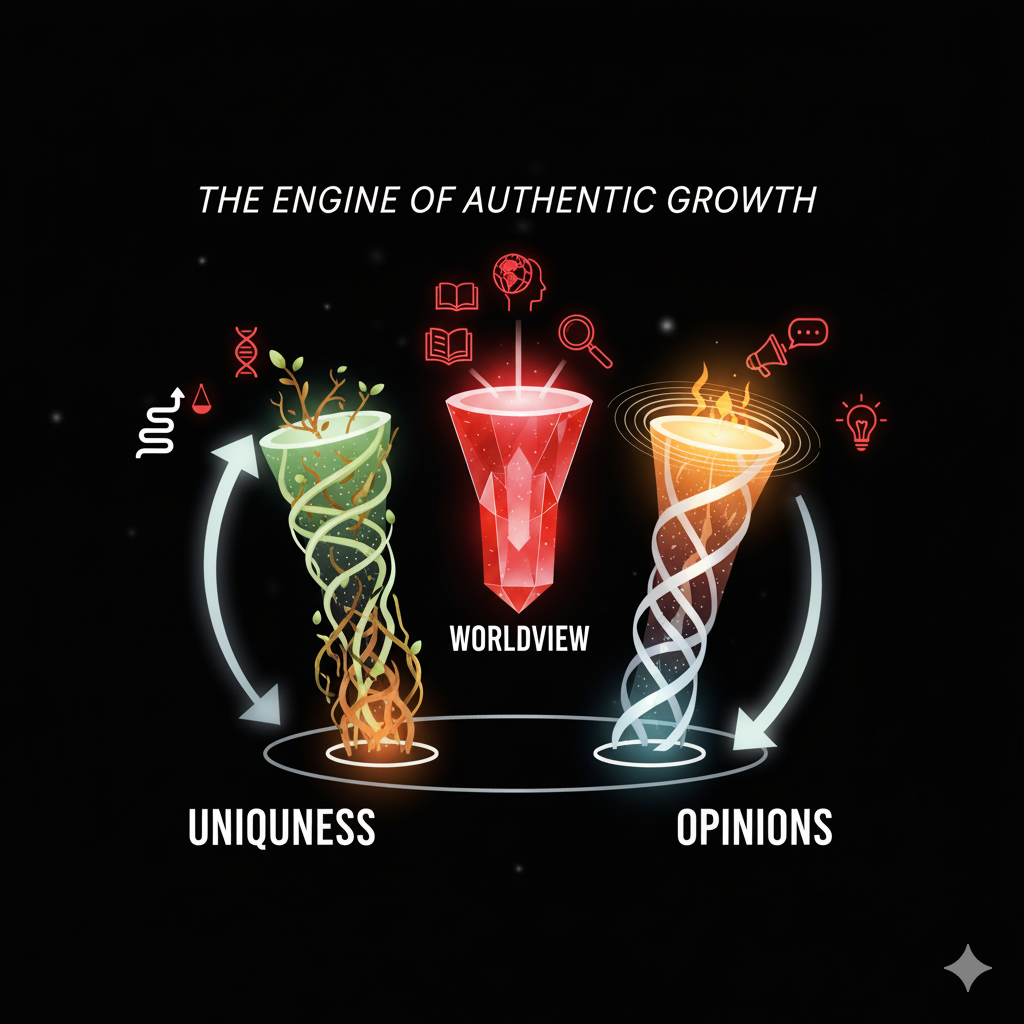Why You Are Not a Copy

I’ve spent a lot of time thinking about what makes me me, and what makes you you. What I’ve realized is that none of us are copies. Even though we share basic human traits, the total picture of our thoughts and beliefs is unique. This is a foundational truth: You are an anomaly. It’s time we stop seeing our differences as problems and start seeing them as the biggest strengths we have.
My personal identity is built on the connection between three main ideas, which I call the Three Pillars of Self: Uniqueness, Worldview, and Opinions. These pillars aren’t just standing still, they’re constantly pushing and pulling on each other in a powerful feedback loop that drives my personal growth.
Pillar 1: Uniqueness (My Foundation)
My Uniqueness is the absolute foundation of who I am. It means that I am one of a kind in how I think, how I solve problems, and how I contribute to the world. I don’t have to earn it; I already am unique just by existing.
My individuality comes from three key places that create my singular story:
My Life Journey
My life journey is the cumulative, unrepeatable story that only I own. Think of it as the sum of every memory, every triumph, every tough struggle, and every mistake I’ve ever made. These events don’t just happen; they change me. My unique threads of struggle or success are why two people can go through the exact same situation and walk away with completely different lessons. I am constantly becoming a distinct person because of this journey.
My Background and Environment
My uniqueness also begins with things I didn’t choose, like my genetic blueprint and the family and cultural traditions that first taught me me the rules of life. The place where I grew up—my environment—also shaped me. Even tiny differences in these factors mean that the person who comes out of them, me, is completely distinct from everyone else.
My Personal Values
Finally, my uniqueness comes from the blend of personal values I hold—things like honesty, loyalty, or curiosity. These values are unique not because I’m the only one who has them, but because of how I rank them and apply them in my life. The specific priority of my values determines where I draw my lines, what I choose to fight for, and what I decide to ignore.
The important philosophical shift for me was moving from thinking these differences were flaws to seeing them as strengths. When I embrace my uniqueness, I gain the confidence to be proud of my own story and trust that my perspective is valuable.
Pillar 2: Worldview (My Evolving Lens)
If my uniqueness is the irreplaceable person I am, my Worldview is the lens through which I filter and interpret everything I see in the world. It’s the crucial middle step between who I am and what I believe.
My worldview is a comprehensive collection of beliefs, assumptions, and values that helps me answer life’s biggest questions: What is fair? What is real? What is possible for me?
How I Built My Lens
The beliefs and assumptions that form my worldview weren’t born with me; I built them over time from three primary sources:
- Foundational Lessons: The first “tint” on my glasses came from my early influences—my family and culture—who taught me the initial rules about right and wrong.
- External Growth: As I started exploring the world, my worldview was challenged and improved by external exposure. Reading different books, meeting people from different cultures, and traveling forces me to test my early lessons against real-world variety. This process is what widens my lens.
- Personal Reflection: This is the most important part—the practice of actively questioning and investigating the ideas I’ve taken in. To have a healthy worldview, I need to be skeptical. I commit to not just accepting an idea because someone told me it’s true, but to checking it against my own experiences: Does this idea still make sense given my unique life journey?
Why My Lens Must Keep Changing
The most powerful truth about my worldview is that it must be dynamic. It can’t be permanent. Holding onto an outdated worldview is like wearing old glasses—it gives me a blurry view of the world right now. Growth requires open-mindedness and the courage to admit when new facts or experiences mean I need to shift my perspective. This ability to adapt is essential for making smart, well-rounded decisions.
Pillar 3: Opinions (My Authentic Product)
Opinions are the final pillar. They are the conclusions, judgments, and perspectives I form about life, representing the moment my unique inner self is projected onto the world. Opinions are the authentic product of my first two pillars.
My opinion is just a snapshot of my current thinking, but that snapshot was developed in a very specific way. It’s shaped by a mix of: facts I’ve learned, the social environment I live in, my early teachings (Worldview), and my deepest personal experiences (Uniqueness). This means every opinion I have is incredibly personal.
Change, Consistency, and Dialogue
Since my opinion is a product of a constantly changing worldview, I know it can’t be set in stone.
- I Embrace Change: I believe I must change my opinions when new evidence or a big new experience comes along, even if it feels uncomfortable. Sticking to old beliefs just to seem consistent is just standing still philosophically.
- I Maintain Consistency: However, some opinions are deeply connected to my core values (like my view on honesty or fairness). These beliefs should remain consistent, acting like anchors when I am challenged.
The real test comes when my opinions meet the world. Sharing my viewpoint takes courage, but holding back my true thoughts makes me feel disconnected from myself and others. I’ve learned that discussions and arguments aren’t battles to win; they are chances to grow and clarify my ideas. When someone disagrees with me, I try to understand the story behind their belief, which helps both of us see what really matters.
The Complete Feedback Loop: The Engine of My Growth
The three pillars—Uniqueness, Worldview, and Opinions—don’t live in separate boxes. They are constantly interacting in a dynamic, continuous feedback loop that drives my growth:
- My Uniqueness Shapes My Worldview: My unique experiences determine which information I pay attention to, which shapes my Worldview lens.
- My Worldview Shapes My Opinions: My lens colors how I process new information and form my final thoughts, resulting in my Opinions.
- My Opinions Reinforce My Uniqueness: The choices and actions that come from my Opinions feed right back into my life, becoming the latest, hardest-won chapters of my ongoing unique story.
To become a better, more integrated person, I have to commit to this process. Growth usually shows up in the uncomfortable moments that force me to check my beliefs and prioritize being authentic over fitting in. Understanding this process makes me more open to myself and to others. I recognize that the world’s diversity is a source of strength, not division, because every single person is operating from a unique, valid story.
The road ahead requires two acts of courage: daring to express my own authentic voice, and remaining open to listening and learning from the voices of others. That continuous process of revision is the story of a life well-lived.
Take a Moment to Reflect
These questions are designed to help you process the three pillars and apply them to your own life:
- Reflect on Uniqueness: What is one specific, hard-won experience from your own life journey that has taught you a valuable lesson no one else could have taught you?
- Reflect on Worldview & Opinions: Think about an opinion you’ve changed in the last year. What new experience or information (from your Worldview or Uniqueness) caused that shift?
- Reflect on Dialogue: How can you use your unique perspective and story to start a truly respectful and productive dialogue with someone who holds a completely different opinion than yours this week?



